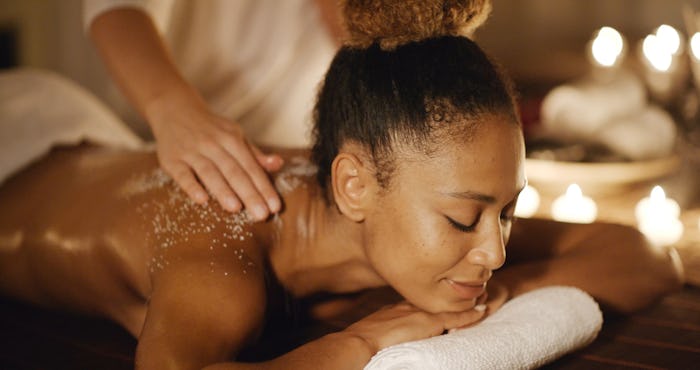Life

Here's How Safe A Prenatal Massage *Actually* Is, According To Experts
If you’re anything like me, you spend your entire first trimester of pregnancy worrying. And because pregnancy loss is heartbreakingly common, you constantly wonder if there's any way to prevent it from happening. To make matters even worse, it's hard to know what advice is based on actual science, and what's based on an urban legend. For example, can a miscarriage cause a miscarriage, or is that just some outdated old wives' tale that needs to die in a fire?
Fortunately, according to the American Pregnancy Association (APA), you can probably go ahead and schedule that undeniably necessary prenatal massage without worrying about miscarriage risk. The same website explains that while some massage therapists won't treat pregnant women in the first trimester, getting a massage is generally considered safe during all three trimesters of pregnancy and won't cause a pregnancy loss. In fact, it turns out not only is getting a massage generally safe during pregnancy, one review of research published in the journal Expert Review of Obstetrics & Gynecology found that getting regular massages during your pregnancy might actually improve your health by reducing stress and relieving quite a few annoying and uncomfortable pregnancy symptoms. That's why, according to the same review, prenatal massage is the most commonly recommended as alternative therapy by obstetrics providers for their pregnant patients.
According to Our Bodies Ourselves, miscarriages or pregnancy loss in the first or second trimesters of pregnancy are, sadly, very common, impacting 15 to 20 percent of pregnancies. The same site notes that while it's natural to worry, most miscarriages are not caused by anything a pregnancy person did or don't do. The site explains that about 70 percent of miscarriages in the first trimester are due to chromosomal abnormalities in the fetus. Other causes include infections, chronic medical conditions, and/or trauma.
The APA notes that many massage therapists won't give massages to women in the first trimester of pregnancy, though. This is not, however, because they massages have been proven to cause harm to pregnant women or increase your risk of having a miscarriage. According to the same website, massage is safe for pregnant women during all three trimesters.
As Licensed Massage Therapist Elaine Stillerman, LMT explains in Massage Today that their refusal to treat pregnant women is probably due to their fear of a lawsuit, not due to actual evidence of risk. Because most miscarriages occur during the first trimester, it's natural to worry that something you did was the cause of a loss, including that one massage you got. As a result, a massage therapist might choose not to treat pregnant women because they are afraid that they might get sued by someone who had a miscarriage — not because a massage caused a miscarriage.
Research shows that getting massages during pregnancy might actually be good for you, your pregnancy and your baby. One review of research published in the Expert Review of Obstetrics & Gynecology found that prenatal massages can help with stress and anxiety, pain relief, and even reduce your risk of pre-term labor and postpartum depression.
According to the American Massage Therapy Association, all massage therapists don't receive specialty training in prenatal massage, though. And they aren't required to actually know how to treat pregnancy-related conditions to advertise prenatal massage services. The same site notes that some massage therapists get advanced training on relieving pregnancy stress and discomfort. So, before you schedule an appointment, you should ask your therapist about their experience. The APA adds that you can also choose a massage therapist who is certified in prenatal massage to help ensure they know how to safely treat the unique problems of pregnancy.
You should also know that, according to the APA, prenatal massage isn't right for all people and all pregnancies. Pregnant women with high risk pregnancies, pregnancy complications like pre-term labor, hypertension, and pre-eclampsia, or who have recently experienced vaginal bleeding should not get prenatal massages. They recommend talking to your doctor or midwife before having a prenatal massage about what's safe for you, which is pretty much always a good idea, anyway.
Check out Romper's new video series, Bearing The Motherload, where disagreeing parents from different sides of an issue sit down with a mediator and talk about how to support (and not judge) each other’s parenting perspectives. New episodes air Mondays on Facebook.